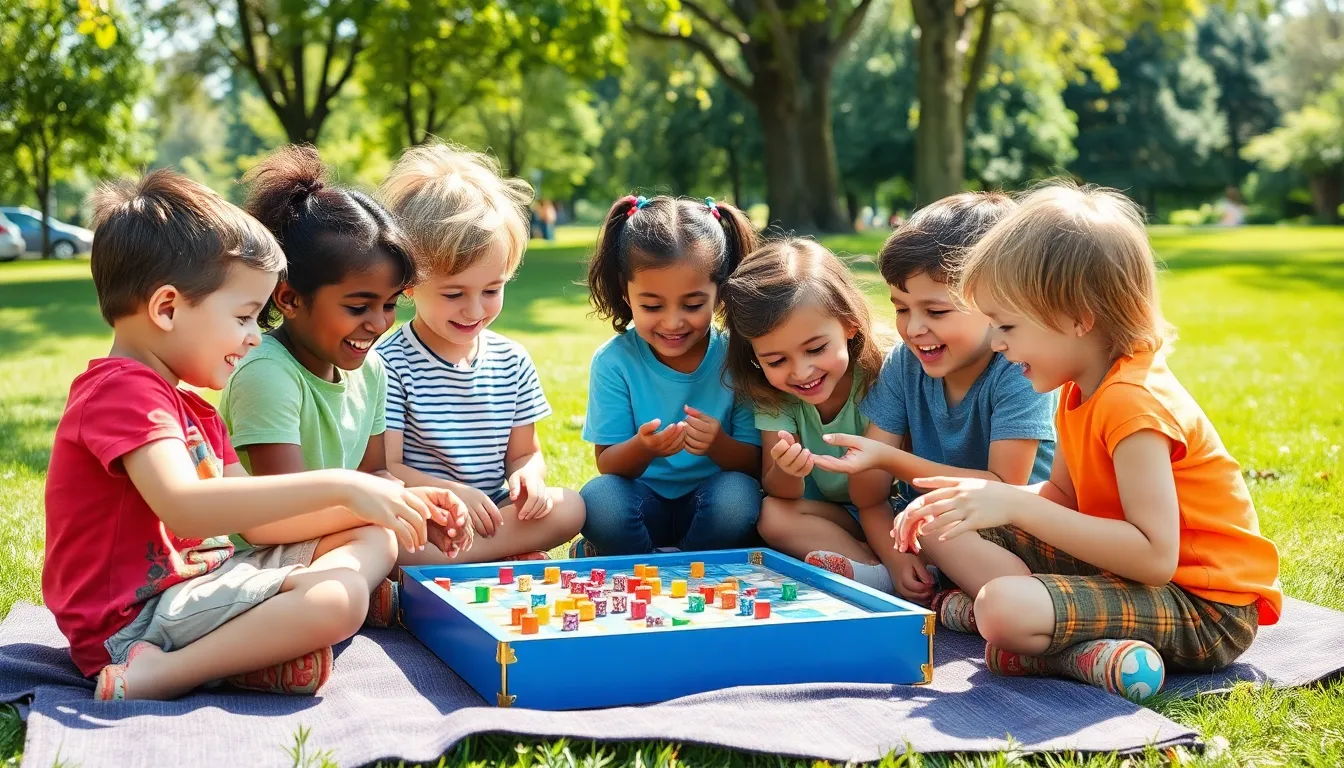Table of Contents
ToggleGames aren’t just for fun anymore—they’re powerful learning tools that smart parents are leveraging to boost their children’s education. When kids engage with educational games, they’re actually developing critical thinking skills, problem-solving abilities, and knowledge retention without even realizing it.
FParentTips has curated the best strategies for transforming playtime into valuable learning experiences. These game-based approaches make education feel less like a chore and more like an adventure. From math puzzles that strengthen numerical fluency to word games that enhance vocabulary, parents can find age-appropriate options that align with their child’s learning style and curriculum needs.
The Power of Game-Based Learning for Children
Game-based learning transforms traditional education by engaging children through play while reinforcing important concepts. Children absorb information more effectively when it’s presented in an interactive, fun format that captures their attention and stimulates multiple senses. Educational games create an environment where kids don’t even realize they’re learning because they’re so immersed in the activity.
Research from the Harvard Education Letter shows that children retain up to 90% of information when engaged in game-based learning compared to only 10% from traditional lectures. Games naturally incorporate key learning principles such as immediate feedback, achievable challenges, and rewards systems that motivate continued engagement.
The cognitive benefits extend beyond subject-specific knowledge. When children play educational games, they develop:
- Critical thinking skills through problem-solving scenarios and strategic decisions
- Spatial awareness via puzzles and building activities
- Executive function by following rules and managing resources
- Social skills through cooperative gameplay with peers or family members
Parents who incorporate learning games into daily routines often report improved focus and attention spans in their children. The emotional connection formed during family game time also creates positive associations with learning, reducing resistance to educational activities.
Digital learning games provide additional advantages through adaptive difficulty levels that automatically adjust to a child’s progress, ensuring they’re consistently challenged without becoming frustrated. However, physical board games and card games offer valuable tactile experiences that help develop fine motor skills while limiting screen time.
By understanding how game mechanics support learning processes, parents can select appropriate games that target specific developmental needs while maintaining the joy of play.
Types of Educational Games That Enhance Learning

Educational games come in various formats, each offering unique learning benefits for children. These games transform abstract concepts into engaging activities that reinforce knowledge while maintaining the fun factor essential for keeping children motivated.
Digital Learning Games
Digital learning games leverage technology to create interactive educational experiences that adapt to a child’s learning pace. Apps like Prodigy Math make arithmetic exciting through fantasy quests, while Duolingo turns language acquisition into a rewarding adventure with immediate feedback. Coding games such as Scratch Jr introduce programming concepts through colorful block-based interfaces that develop logical thinking. PBS Kids offers educational games featuring familiar characters that teach science concepts through engaging storylines. These digital options excel at automatically adjusting difficulty levels based on performance, providing personalized learning paths that maintain an optimal challenge level for each child’s abilities and tracking progress over time.
Traditional Board Games and Puzzles
Traditional board games and puzzles deliver tactile learning experiences that digital alternatives can’t replicate. Scrabble enhances vocabulary and spelling through competitive word creation, while Monopoly introduces financial literacy concepts like budgeting and investment strategies. Chess develops strategic thinking and planning abilities by requiring players to anticipate multiple moves ahead. Jigsaw puzzles strengthen spatial awareness and pattern recognition as children manipulate physical pieces to complete images. These games foster face-to-face social interaction, teaching valuable skills like taking turns, following rules, and graceful winning or losing. The physical components of these games provide sensory feedback that reinforces learning through multiple channels, creating stronger memory connections for developing minds.
Outdoor Games That Teach
Outdoor educational games combine physical activity with learning, creating powerful multisensory experiences. Nature scavenger hunts transform outdoor exploration into science lessons as children identify plants, animals, and natural phenomena. Counting hopscotch incorporates mathematics into playground fun by requiring players to perform calculations before hopping. Outdoor measurement activities teach estimation and mathematical concepts when children use natural objects like sticks to measure distances. Garden-based games introduce biology concepts through planting and observing plant growth cycles. These active learning experiences benefit physical development alongside cognitive growth, helping children expend energy while absorbing educational content. The changing outdoor environment also provides contextual variety that keeps games fresh and engaging across repeated play sessions.
How Games Develop Essential Skills
Games serve as powerful developmental tools, building fundamental skills that extend far beyond entertainment value. When children engage with games, they’re actively participating in experiences that shape their cognitive, social, and problem-solving abilities in meaningful ways.
Cognitive Development Through Play
Play-based learning strengthens neural connections crucial for cognitive development. Children develop memory skills during matching games, language acquisition through word puzzles, and mathematical reasoning with number-based activities. Pattern recognition emerges naturally as kids identify sequences in strategy games like chess or connect-the-dots puzzles. Spatial awareness improves significantly when children manipulate physical game pieces or navigate virtual environments. Research from the American Academy of Pediatrics confirms that regular gameplay enhances attention spans and concentration abilities in children across age groups. Games with progressive difficulty levels also teach persistence and focus, allowing children to build executive function skills in an engaging context.
Social Skills and Emotional Intelligence
Multiplayer games create natural laboratories for developing crucial social competencies. Children learn turn-taking, sharing, and conflict resolution during board game sessions with family members or peers. Cooperative games teach teamwork and communication as players must strategize together toward common goals. Kids practice reading social cues and facial expressions during face-to-face gameplay, strengthening their emotional intelligence. Games involving role-playing help children understand different perspectives and develop empathy for others’ situations. Young players also learn to manage disappointment and frustration when losing, building emotional resilience through repeated experiences. These social interactions during gameplay translate directly to improved relationship skills in school and community settings.
Problem-Solving and Critical Thinking
Strategic games challenge children to analyze situations, evaluate options, and make decisions with limited information. Chess, logic puzzles, and strategy board games encourage forward thinking and anticipating consequences of actions. Children develop adaptive thinking when game conditions change unexpectedly, requiring flexible problem-solving approaches. Games with resource management elements teach prioritization and efficiency as players determine optimal uses for limited assets. Coding games introduce computational thinking patterns where complex problems break down into manageable steps. Mystery games and escape rooms develop deductive reasoning skills through clue analysis and pattern identification. These critical thinking abilities transfer naturally to academic challenges, with studies showing gamers excel at scientific reasoning tasks and complex problem-solving scenarios.
Practical Tips for Parents to Implement Game-Based Learning
Implementing game-based learning at home requires thoughtful planning and strategic execution. Parents can transform ordinary play sessions into enriching educational experiences with the right approach and resources.
Choosing Age-Appropriate Educational Games
Selecting games that match your child’s developmental stage maximizes learning potential while maintaining engagement. For preschoolers (ages 3-5), opt for simple memory games, basic counting activities, and picture-based puzzles that build fundamental recognition skills. Elementary-aged children (6-10) benefit from games like Scrabble Junior, Math Bingo, and strategy-light board games that reinforce school concepts. Tweens and teens (11-16) engage more deeply with complex strategy games, coding challenges, and simulation games that apply real-world concepts. Check game packaging for recommended age ranges, but also consider your child’s individual interests and abilities when making selections. Educational games work best when they’re slightly challenging—providing enough difficulty to stimulate learning without causing frustration. Parents should periodically reassess game selections as children develop new skills and interests throughout their educational journey.
Balancing Screen Time With Other Gaming Activities
Creating a healthy mix of digital and non-digital game experiences enriches children’s learning environment. Digital games offer adaptive learning paths and immediate feedback, making them valuable tools for personalized education. Parents can establish clear boundaries by setting daily screen time limits—typically 30-60 minutes for younger children and 1-2 hours for older ones. Create a weekly schedule that alternates between digital learning games and physical activities like board games, card games, and outdoor educational challenges. Priority should be given to high-quality digital games with educational value rather than purely entertainment-focused options. Monitor physical cues during digital play; restlessness, eye fatigue, or irritability signal it’s time for a break. Incorporate “tech-free” days each week to encourage creative thinking through traditional games and hands-on activities. This balanced approach ensures children reap the benefits of both gaming worlds while developing healthy technology habits.
Creating Learning Opportunities in Everyday Play
Everyday activities offer countless opportunities to incorporate playful learning experiences for children. Parents can transform routine moments into engaging educational opportunities that reinforce concepts while maintaining the joy of discovery and play.
Turning Household Activities Into Learning Games
Household chores transform into powerful learning tools with minimal effort and creativity. Kitchen activities provide math practice through measuring ingredients, comparing quantities, and discussing fractions when cutting food. Laundry sorting becomes a lesson in categorization by color, size, or type of clothing. Grocery shopping introduces budgeting concepts when children help compare prices or calculate totals. Bath time serves as a natural science lab for exploring concepts like floating, sinking, and volume with different containers. Even cleaning up toys offers opportunities to learn organizational skills through sorting by shape, color, or function. Parents who incorporate counting, naming colors, or asking open-ended questions during these routine activities create natural learning moments that children eagerly participate in without feeling like they’re studying.
Using Travel Time for Educational Fun
Car rides and commutes convert into valuable learning sessions that engage children’s minds during otherwise idle time. License plate games encourage reading skills and geographic awareness when spotting different states or countries. “I Spy” games sharpen observation abilities and vocabulary as children describe what they see. Audiobooks selected for age-appropriate content expand children’s literary exposure and comprehension skills during longer journeys. Travel bingo with cards featuring common road signs, vehicles, or landmarks combines fun with environmental awareness. Simple math challenges like counting specific colored cars or adding numbers on license plates reinforce arithmetic skills. Public transportation rides offer chances to discuss maps, directions, and urban planning with older children. These travel games effectively combat boredom while simultaneously building knowledge across multiple subject areas without requiring additional materials or extensive preparation.
Addressing Common Parental Concerns About Learning With Games
Many parents worry that educational games may distract children from “real learning.” Research shows that well-designed games actually enhance cognitive development, with children retaining up to 90% of information learned through play compared to traditional methods.
Parents often question whether games promote laziness or reduce motivation for traditional schoolwork. Educational games typically achieve the opposite effect—they build persistence, teach children to overcome challenges, and foster intrinsic motivation that transfers to other learning environments.
Concern about excessive screen time is valid for digital educational games. Experts recommend setting clear time limits (60-90 minutes daily for school-age children) and balancing digital games with physical activities, board games, and outdoor educational play.
Some parents fear games lack academic rigor or don’t align with school curriculum. Today’s educational games are increasingly developed with input from educators and child development specialists, often mapping directly to grade-level standards. Products from companies like DreamBox and BrainPOP explicitly align with national curriculum frameworks, making them valuable supplements to classroom learning.
The competitive nature of games raises concerns about potential stress or discouragement. Quality educational games incorporate adaptive difficulty levels that adjust to a child’s abilities, ensuring challenges remain within their “zone of proximal development”—difficult enough to engage but not so hard they become frustrated.
Many parents worry about the quality of social interactions during game play. Multiplayer educational games, whether digital or physical, promote valuable social skills like turn-taking, teamwork, and communication. Family game nights create opportunities for meaningful conversations and bonding while reinforcing learning concepts in a pressure-free environment.
Conclusion
Educational games transform ordinary play into powerful learning opportunities for children of all ages. By incorporating games into daily routines parents can boost critical thinking problem-solving skills and knowledge retention while creating positive associations with learning.
The evidence is clear – children learn more effectively through play with retention rates soaring to 90% compared to traditional methods. Whether digital adaptive games physical board games or outdoor activities the key is selecting age-appropriate options that target specific developmental needs.
FParentTips encourages parents to embrace both structured educational games and spontaneous playful learning moments. By balancing screen time creating learning opportunities in everyday activities and addressing common concerns parents can harness the full potential of game-based learning for their children’s development.




